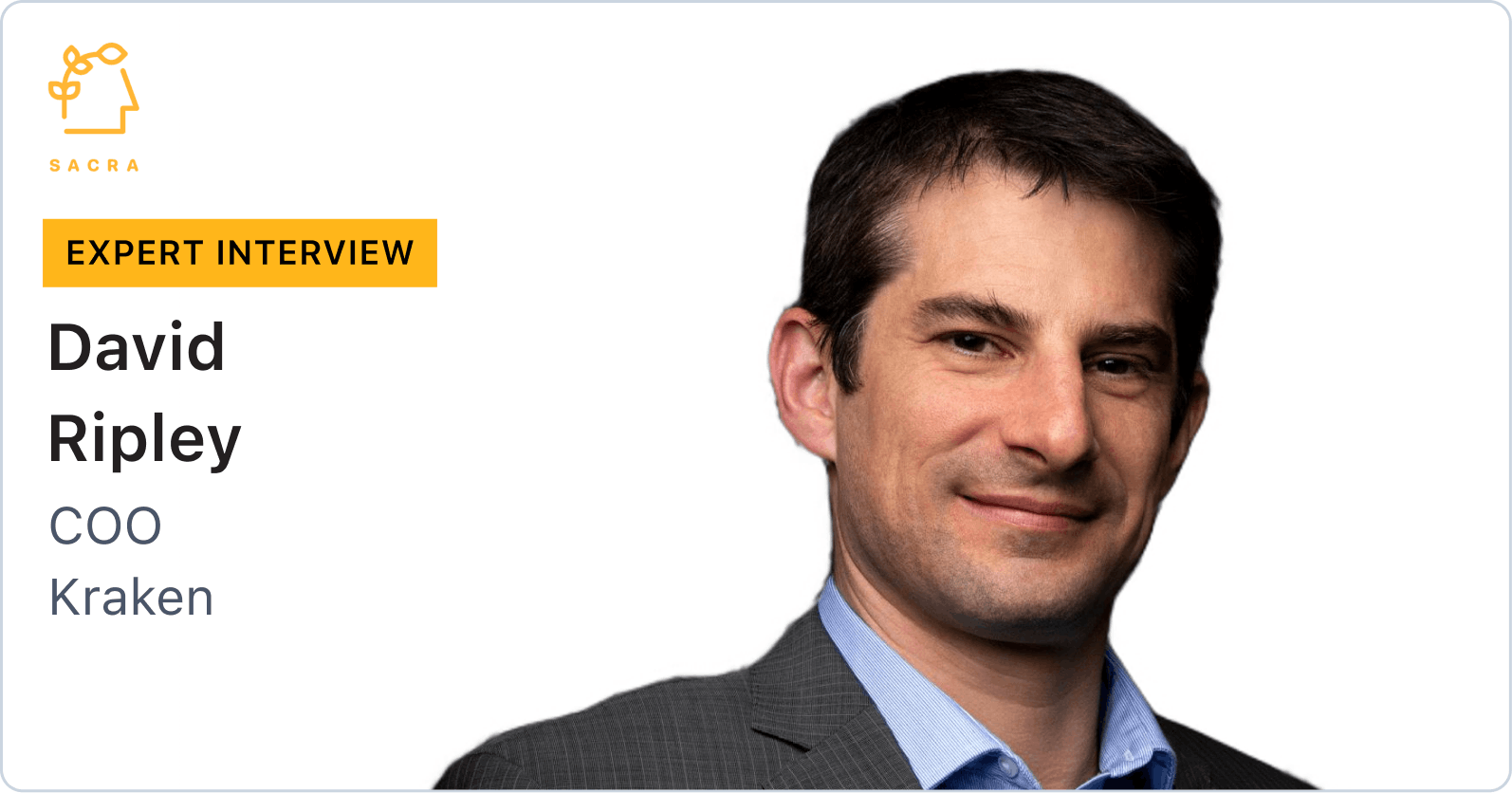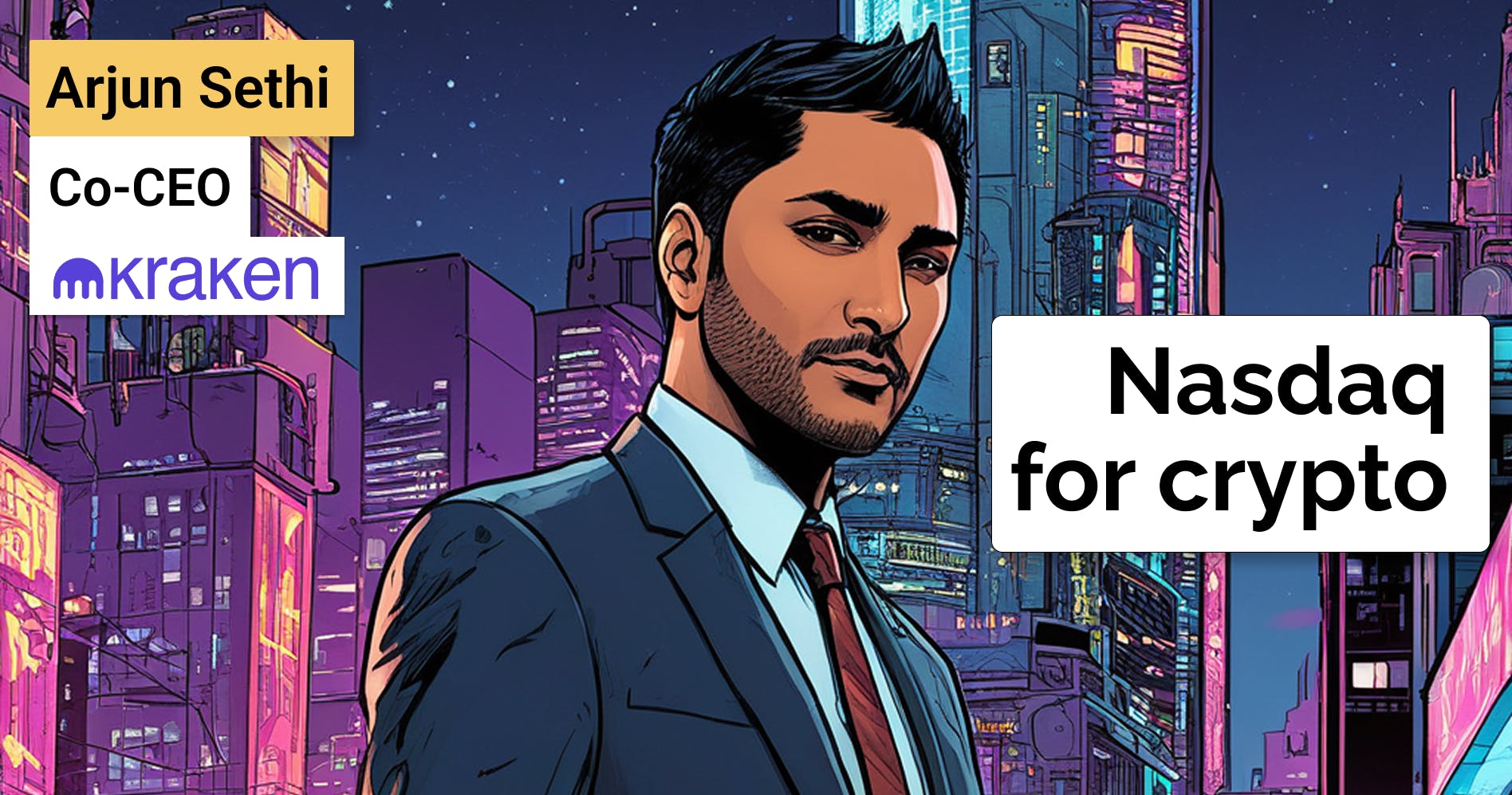David Ripley, COO of Kraken, on the future of cryptocurrency exchanges
 Jan-Erik Asplund
Jan-Erik Asplund

Background
David Ripley is the COO of cryptocurrency exchange Kraken. We talked to David to learn more about how Kraken thinks about its positioning in the cryptocurrency market, how Kraken thinks about layering on new web3 and DeFi products, and how cryptocurrency exchanges are evolving as they lose their monopoly on the crypto on-ramp to DeFi and other products.
Questions
- How does Kraken differentiate itself from other exchanges like Coinbase, FTX, and Binance? What are some of the core customer segments your platform attracts? Which use cases do you do better than your competitors?
- What’s your take on decentralized exchanges which constitute a larger portion of the market today? Do you compete for the same customer segments? How do decentralized exchanges relate to your work?
- When the exchange started, a lot of the product-market fit came from the fact that it was the first on-ramp to crypto that worked with Euro. Your platform has a strong presence in Europe which is your core customer base. Where will Kraken focus its future growth between the US, Europe, and the rest of the world?
- Kraken’s competitors are taking on celebrity endorsements to make themselves known in North America. What are your thoughts on advertising? Why haven’t you taken that route? How would you want to make yourself known as an exchange given your expansion plans?
- How is this universe of investable assets and new financial services such as flash loans expanding? How do you feel about rolling out these new types of products at Kraken?
- Do products like staking and futures trading form a meaningful percentage of revenue for Kraken? What's the strategy around these kinds of products moving forward?
- For most users today, interacting with a crypto exchange or a wallet is their introduction to the crypto ecosystem. How do you see that potentially evolving over the next few years?
- Does the number of employees getting paid partially in crypto constitute a large portion of your workforce? Are other companies seeing greater employee demand for compensation in crypto? What’s your observation here?
- Given the current crypto bear market, how does the role of an exchange like Kraken change as compared to in a bull market?
- There are concerns about the solvency of crypto exchanges in these volatile times. What would happen to crypto stored on these exchanges? Can they protect users' crypto in the face of insolvency?
- What are your views on the custodial wallet versus non-custodial wallet debate? What are some of the tailwinds driving growth of custodial wallets? What are the drivers for fast-growing non-custodial wallets like MetaMask?
- How have user journeys with wallets changed over time? Do people tend to stick with one type of wallet or do they switch back and forth between different types? What factors help either case?
- What’s the impact of larger traders or whales on crypto liquidity? How do they affect your exchange as the market speeds up or slows down?
Interview
How does Kraken differentiate itself from other exchanges like Coinbase, FTX, and Binance? What are some of the core customer segments your platform attracts? Which use cases do you do better than your competitors?
Kraken's an exchange platform that's been around for a decade. There are several things Kraken does really well vis-à-vis our nearest peers: the top three would be security, service, and bringing innovative offerings to bear.
Security is obviously an incredibly meaningful part of the space and one of the things Kraken absolutely does best.
We invest massively in this area, and through Kraken Security Labs, we secure crypto holders throughout the industry. We investigate various hardware wallets and vulnerabilities, and publish freely-available reports and guidance for clients on how to trade and use crypto safely and securely.
Service-wise, our whole team is incredibly deep in crypto expertise. They have our clients' best interests in mind and get some of the most fantastic reviews from people in this space.
The most interesting thing, however, would be our innovative offerings—and there are a lot of firsts here.
We were one of the first exchanges to go multitoken. When many of our peers were focused on Bitcoin, we were one of the first to list Ethereum.
We brought out a lot of early pro trader products, we were one of the first to support margin trading, futures, and derivatives, and we also brought a trading terminal to the space. There's a long line of those kinds of products I could run through that we have planned for the future as well.
What’s your take on decentralized exchanges which constitute a larger portion of the market today? Do you compete for the same customer segments? How do decentralized exchanges relate to your work?
First off, decentralized exchanges are fantastic—as are all of these innovations happening on-chain across the networks. We couldn't be bigger supporters and fans of all of these decentralized technologies. Our mission is really to help grow these technologies and drive their adoption.
Is it true that some of our clients use decentralized exchanges? I certainly hope so, because we're very much their fans. From one perspective, you could say that maybe we’re competing with decentralized exchanges, and on the surface, it might look like we are. The real answer, though, is that for each dollar of trade volume that moves off of Kraken to a decentralized exchange, we get two back—just based on the overall growth and adoption of the space from existing and new clients.
Sacra highlight
When the exchange started, a lot of the product-market fit came from the fact that it was the first on-ramp to crypto that worked with Euro. Your platform has a strong presence in Europe which is your core customer base. Where will Kraken focus its future growth between the US, Europe, and the rest of the world?
We did launch first and foremost in Europe. At one point, we were the only place where you could buy Bitcoin with Euros, and it's still one of the most significant markets for us.
Since 2013, we have moved into many other geographies around the world. We serve 180 to 190+ countries today with different levels of service.
Do we support the local fiat currency? Euro is one. We also support the British Pound and the Swiss Franc in that broader region of Europe.
Kraken’s competitors are taking on celebrity endorsements to make themselves known in North America. What are your thoughts on advertising? Why haven’t you taken that route? How would you want to make yourself known as an exchange given your expansion plans?
North America is another market where we have a significant presence. We’ve been in the US and Canada for a number of years. We also have many growth regions such as Japan, Australia, and the UAE where we're building a greater presence.
A number of our peers are doing a lot of marketing and this is true across crypto. Regardless of whether it's our direct or indirect peers, it's an incredibly fast-growing space and that just attracts a lot of new entrants. I think Kraken's been incredibly fortunate to have a really strong brand and an equally strong product set. We've driven fantastic client acquisitions just based on those. Our minimal marketing notwithstanding we see that Kraken has huge potential.
Sacra highlight
How is this universe of investable assets and new financial services such as flash loans expanding? How do you feel about rolling out these new types of products at Kraken?
However, we expect that we'll increasingly drive more and more activity externally for Kraken. We’ve recently added a new member, Mayur Gupta, Chief Marketing Officer for Kraken, to the leadership team and there are many fantastic initiatives and things that we expect to see in the near future.
It's a balance. While there's a huge value in leaning into the innovations, leading into new use cases, and bringing more options and opportunity to our clients, it’s important for us to maintain a really high degree and standard of security.
Before we add any new token or new part to the platform, we take a deliberate approach from a security standpoint to ensure the experience is right and the security is on point.
Do products like staking and futures trading form a meaningful percentage of revenue for Kraken? What's the strategy around these kinds of products moving forward?
There's a lot of market risk and price risk with a lot of different assets in the cryptocurrency space. Volatility is also something that comes with nascent technology. We educate and inform our clients so they can decide whether they want to participate in those investments or not.
For most users today, interacting with a crypto exchange or a wallet is their introduction to the crypto ecosystem. How do you see that potentially evolving over the next few years?
Futures and staking have grown to become a much more meaningful share of revenue. Those kinds of products are an internal driver of diversification across our business, which has its own benefits, but then they also bring more product breadth to our clients. They’ve also shown how Kraken can be really meaningful within the ecosystem—so they are key to where Kraken's going as a business.
In the past, nearly 100% of the first interactions that anyone had with Bitcoin and Ethereum came through an exchange. You're now starting to see that changing—you’re seeing people get paid in crypto, for example. Kraken is a company where a lot of people get paid partially or even fully in Bitcoin and other cryptocurrencies. But there are other paths as well.
Sacra highlight
Does the number of employees getting paid partially in crypto constitute a large portion of your workforce? Are other companies seeing greater employee demand for compensation in crypto? What’s your observation here?
By and large, when you're talking about that first step it's just about buying the currencies—Bitcoin, Ethereum, and others—with whatever they have, whether that’s US Dollars or Euros or something else.
What we’re on the precipice of is a place where individuals will first get into crypto via a use case, whether that’s gaming or a decentralized virtual world.
We're seeing more and more individuals move into crypto because of one of these use cases or something like NFTs. It’s still a small number, as most of those people have probably already bought some Bitcoin or Ethereum by the time they enter one of these use cases. But we're starting to scratch the surface where some of the use cases actually drive the purchases.
For Kraken, specifically, it's definitely growing. We have 3,000 Krakenites and a significant percentage get paid, at least in part, in crypto. That's certainly grown over time and continues to grow even as we add new people to the company.
There’s less visibility into other companies, but I do know that there are many in the crypto space that offer this as well. Many individuals outside of crypto, the freelancers and global remote individuals that are working for a company in a different country, also prefer this since it helps solve some of the cross-border payments.
Given the current crypto bear market, how does the role of an exchange like Kraken change as compared to in a bull market?
There are concerns about the solvency of crypto exchanges in these volatile times. What would happen to crypto stored on these exchanges? Can they protect users' crypto in the face of insolvency?
We don't think it will fundamentally change. Our messaging doesn't drastically change. The bull markets in crypto are times for exchanges to really do everything they can to serve customers under incredible levels of peak demand. The slower times, when the market plateaus, are fantastic opportunities for us to work on scaling infrastructure and building new products.
From where we stand at this point, we're familiar with the cycle and we see the benefits to our ability to internally focus, build a business, and bring value to clients.
What are your views on the custodial wallet versus non-custodial wallet debate? What are some of the tailwinds driving growth of custodial wallets? What are the drivers for fast-growing non-custodial wallets like MetaMask?
This comes back to our initial discussion. Security is top priority for us and a security event would be a black swan for many crypto exchanges.
For Kraken, the platform is 100% solvent. If you put your crypto on Kraken, it's not being lent out. It is securely stored. That's really what we emphasize. We're not engaging in other areas to introduce risk.
Once upon a time, the only wallets were non-custodial wallets, and the user experience was challenged on a lot of those.
Then came the first custodial wallet—and afterwards, the exchanges which provided an on-ramp from fiat to crypto. That on-ramp is often easier to do through a custodial offering, much the same as fiat.
How have user journeys with wallets changed over time? Do people tend to stick with one type of wallet or do they switch back and forth between different types? What factors help either case?
What we're seeing now is the non-custodial wallets improving their user experience, and that's fantastic. This almost goes back to a little of our discussion on decentralized exchanges: using Bitcoin and crypto in a non-custodial way is the purest way to use crypto.
At the same time, there's a ton of value to offering a custodial and off-chain experience, particularly if you're interacting with the fiat ecosystem. We really think both are the future and we hope that non-custodial usage continues to grow significantly.
When you think outside of crypto, you just think about assets and money, which are more sticky. People stick with one financial institution for many years and some of that is true in crypto, particularly for the large balances.
What’s the impact of larger traders or whales on crypto liquidity? How do they affect your exchange as the market speeds up or slows down?
There tends to be a stickiness with regard to various different wallets, whether it's a hardware wallet that's used more for spending or low balances and may incorporate a number of different features and functionality.
There's a lot of innovation going on in that space as well with all the different use cases. I think people are also interested in trying non-custodial wallets that have new and interesting use cases, features, and functionality.
Kraken serves a range of different clients from individuals, consumers, active and professional traders to larger institutions and traders often called whales in the crypto space.
We see their activity continue probably to a similar or more significant degree than consumers across cycles.
Some of them might be trading or investing professionally, which leads to them continuing their activity throughout the cycles.
Disclaimers
This transcript is for information purposes only and does not constitute advice of any type or trade recommendation and should not form the basis of any investment decision. Sacra accepts no liability for the transcript or for any errors, omissions or inaccuracies in respect of it. The views of the experts expressed in the transcript are those of the experts and they are not endorsed by, nor do they represent the opinion of Sacra. Sacra reserves all copyright, intellectual property rights in the transcript. Any modification, copying, displaying, distributing, transmitting, publishing, licensing, creating derivative works from, or selling any transcript is strictly prohibited.





